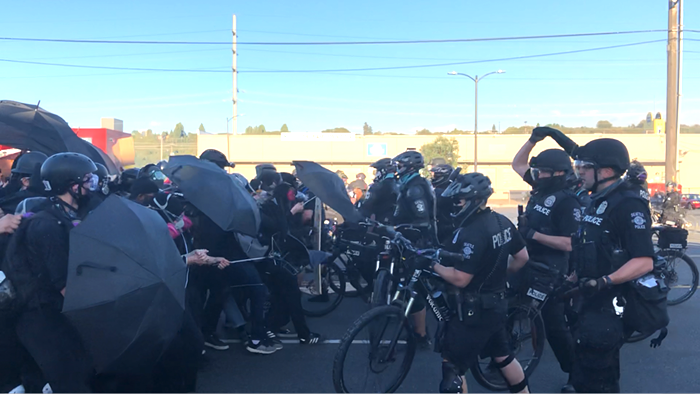In a hearing on Tuesday, U.S. District Court Judge James L. Robart expressed pride in the Seattle Police Department’s response to more than a decade of federal oversight and appeared ready to return more control to local entities. Groups across the political spectrum–abolitionists, reformers, Punisher tattoo enthusiasts–all support that outcome. However not everyone thinks a decision to lift the consent decree would represent a new dawn in constitutional policing or believes in his stated vision for restoring faith in police.
On the bench, Judge Robart said communities in the West need to reestablish the notion that people who work as police officers perform an honorable duty.
“Who do you think you’re going to call in an emergency?” he asked. The police, he answered.
Robart did not say when he would issue a ruling on the motion to reduce federal oversight, which Seattle city officials and the Department of Justice proposed to the court in March. Based on his closing comments he seems prepared to reduce supervision in all but two areas: crowd control and police accountability.
Not everyone in the courtroom shared Robart’s faith in the progress of Seattle policing, but that didn’t mean they wanted him to rule differently.

Po Leapai, who works with the Washington Coalition for Police Accountability and who sits on the Washington State Office of Independent Investigations Advisory Board, attended the hearing in a shirt emblazoned with the face and name of his cousin, Iosia Faletogo, who Seattle Police shot and killed on New Year’s Eve in 2018.
Robart’s comments, as well as briefs from the City and the DOJ supporting the end of the consent decree, support a pro-policing narrative that will dominate if the people harmed by police violence aren’t ready with the counterargument, Leapai said. He argued that federal oversight did not establish real accountability systems, leaving police to investigate themselves.
In 2021, the civilian-run Office of Police Accountability (OPA) justified the killing of Faletogo despite body-camera video that appeared to show him unarmed moments before police killed him. The City agreed to pay $515,000 to settle a civil rights lawsuit filed by Faletogo’s estate. The majority of the money went to Faletogo’s two children, who were both under the age of ten when he died.
Leapai isn’t alone in his criticism.
Seattle spent 11 years and $200 million on reshaping the police department in ways the federal government often dictated. Despite the City and the DOJ giving lip service to the importance of community involvement in molding a police department to serve them, the very nature of a consent decree limits public input, said the Seattle Community Police Commission (CPC) in a letter to the court supporting the motion to reduce federal oversight.
Purpose Dignity Action Co-Executive Director and one of the first co-chairs of the CPC, Lisa Daugaard, told The Stranger in April the consent decree reforms often fell short of what community leaders wanted, with transformative policies set aside in favor of more muted, conservative ones.
Robart may replace the consent decree with a smaller oversight measure called a compliance agreement, which includes an assessment of Seattle’s police accountability institutions. In that process, the federal monitor would hire a consultant to assess the resilience and effectiveness of the institutions set to replace the consent decree’s oversight role. Those institutions include the Office of Inspector General for Public Safety (OIG), the OPA, and the CPC.
During the hearing, Robart told Assistant City Attorney Kerala Cowart that the public may struggle to trust the current oversight regime since it has yet to rule a police killing as unjustified. However, he did not press Cowart when she described the City’s investigations into lethal force as adequate.
Robart did grill Cowart and DOJ Civil Rights Attorney Tim Mygatt over whether the consent decree required SPD to improve racial disparities, citing an increase in fatal police shootings of nonwhite people. Cowart argued the consent decree covered racial disparities and bias related to stops and detention, but it did not require racial disparity to disappear altogether from police data. She acknowledged a need for continued reform in this area.
Cowart and Mygatt said they expected SPD to reach compliance goals regarding crowd control tactics and police accountability by December 31, 2023. Robart expressed skepticism about the deadline, noting the ongoing contract negotiations between the City and SPD.




















